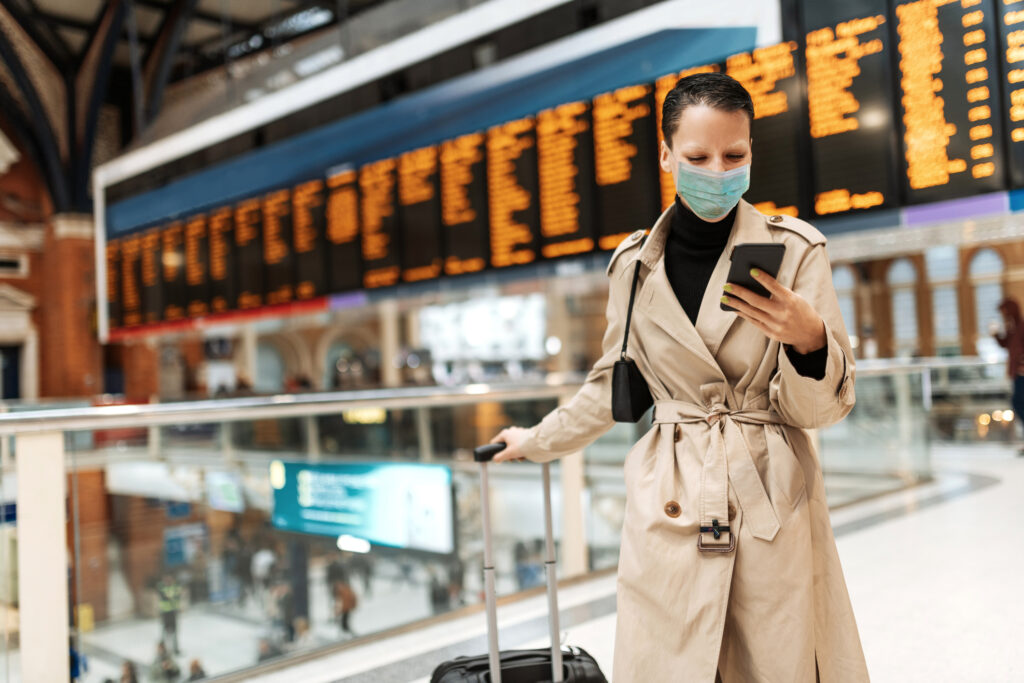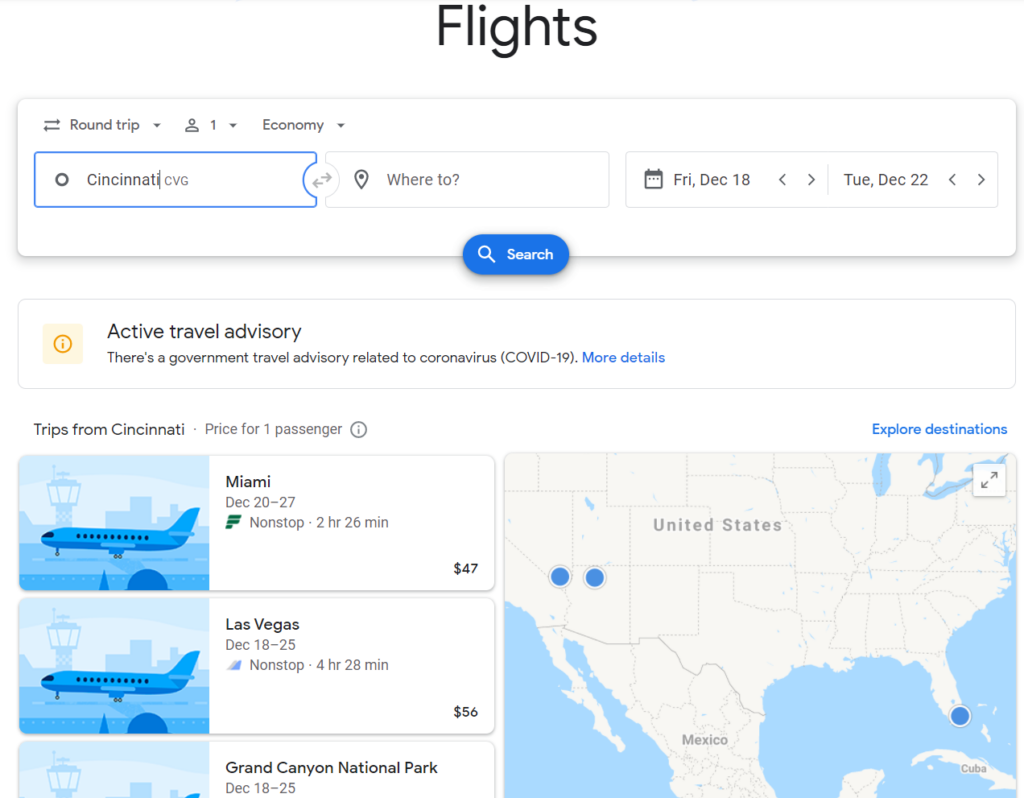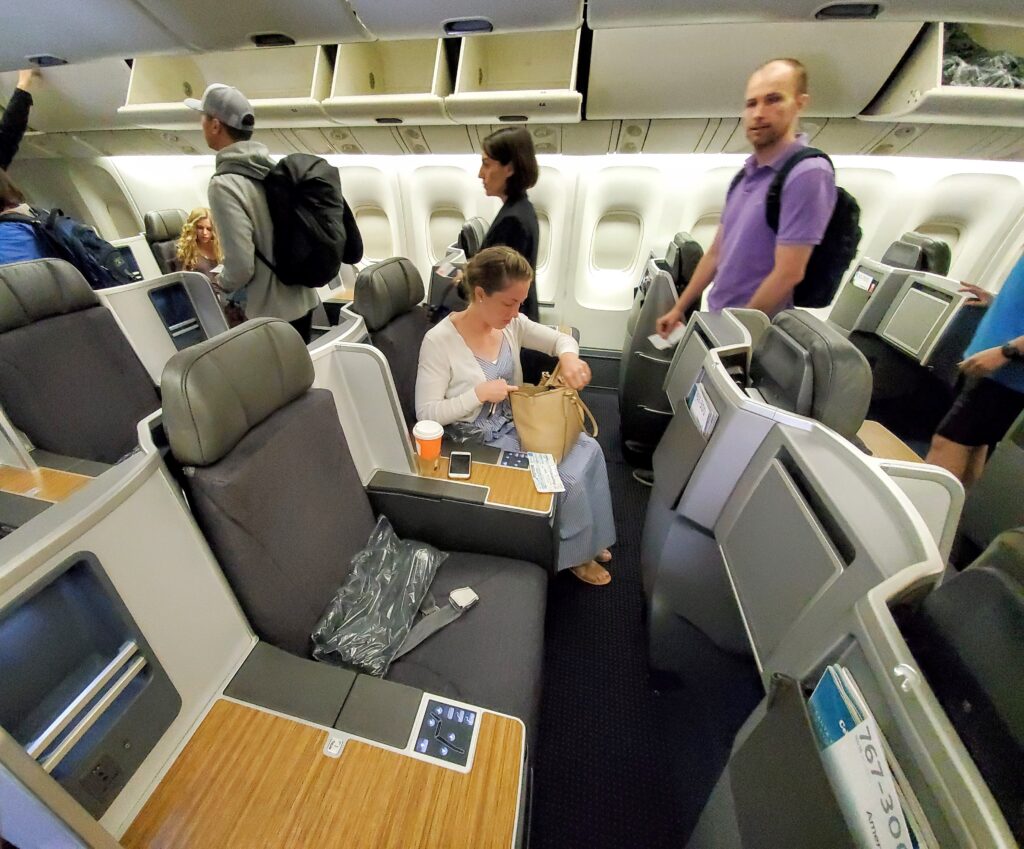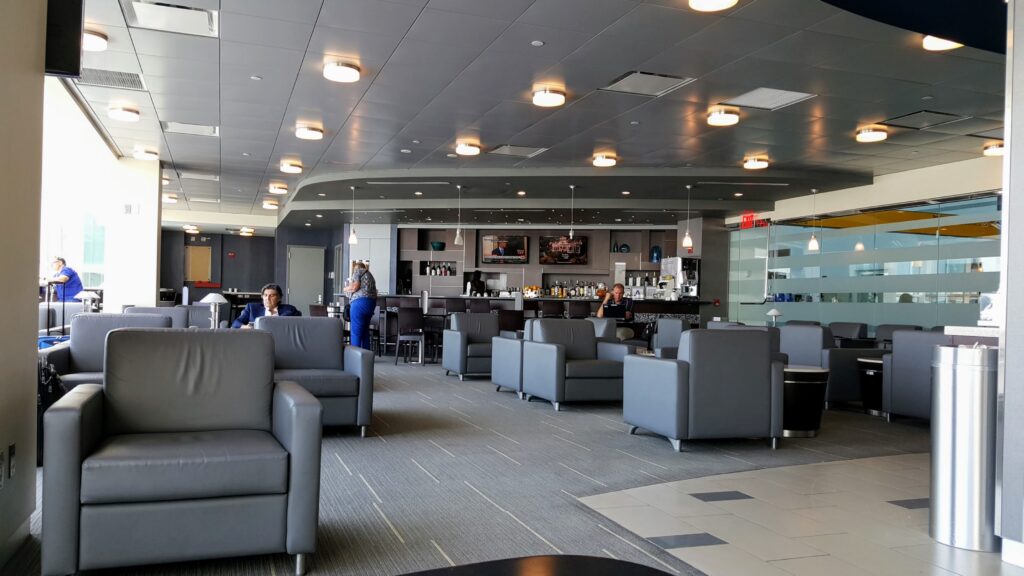How to navigate travel anxiety in the age of COVID-19
Signing up for credit cards through partner links earns us a commission. Terms apply to the offers listed on this page. Here’s our full advertising policy: How we make money.
Update: One or more card offers in this post are no longer available. Check our Hot Deals for the latest offers.
Even experienced road warriors and frequent flyers can struggle with travel anxiety — especially when it comes to getting on an airplane. From unexpected turbulence to delayed travel plans, it doesn’t take much for many to develop a pit in their stomach. A sharp rise in COVID-19 cases doesn’t help, either!
It’s easy to see why some avoid air travel completely. A raging pandemic, long security lines, delays, booking complications, layovers, etc. are just a handful of issues that can increase travel anxiety. And with the holidays around the corner, most of those things are about to get worse. Thankfully, there are a few tricks to make traveling less stressful. Many of us on the team have 15+ of the best travel credit cards, which help reduce travel stresses by providing amazing perks, like trip interruption insurance and airport lounge access.
While these tips might not absolve you of travel fears, they can hopefully provide some comfort that you’re not alone.

Coping with anxiety during COVID-19
Plenty of would-be travelers are experiencing enough stress from the coronavirus at home, let alone while traveling. Whether the pandemic has sparked financial concerns, health concerns for you or your family, ever-mutating restrictions creating unknowns for your potential travel plans, etc., anxiety drenches 2020.
Is it safe to fly during coronavirus?
In the same breath that experts urge you to stay home, they will also admit that flying on a plane isn’t high-risk. True, it’s riskier than sitting behind a pile of storage boxes in your locked basement, but considering the activities you may do at home, like grocery shopping, eating out, etc., flying on a plane is likely in the same ballpark.
Studies have shown that COVID-19 virus doesn’t spread as easily on planes, thanks to an aircraft’s HEPA filtration systems, which are fantastic at filtering air and keeping you relatively safe in the fuselage. You can mitigate risk further by choosing to fly an airline that is still blocking middle seats, like Delta and Alaska Airlines.
There are tons of other precautions airlines are taking, as well, like mask mandates and extensive cleaning. Read our post outlining whether it’s safe to fly during coronavirus for more details about what airlines are doing — and which are doing them best.
However, the travel process itself can pose more risks – busy airports, security lines and the boarding/deplaning process is where the spread of COVID-19 is more likely. Make sure to research all of the potential dangers and speak to your doctor before traveling. Being thoroughly informed and making a decision based on your own personal risk factors, as well as the people you will come into contact with, is important.
All that being said, it’s important to note that the Center for Disease Control says postponing travel and staying home is the best way to protect yourself and others from COVID-19. Additionally, the CDC reports that while you may feel well and not have any symptoms, you can still spread COVID-19 to family, friends and the community after travel.
Tips to calm coronavirus anxiety while traveling
- Keep up to date with your destination’s coronavirus restrictions: Even if you’re flying domestically, each state has its own unique rules and regulations. That’s right — 50 different laws. The more you know, the less will surprise you when you get there
- Plan your trip to a T: Your ground transportation, your hotels, your activities, your meal plans, everything. Do your prep now so your anxiety chamber can fill with things other than logistics. Make sure to pack plenty of materials to defend against COVID-19 like N95 or KN95 masks, hand sanitizer and disinfecting wipes.
- Stay flexible: If you’re flexible with your travel dates, try to fly on less busy days and on a flight that’s not booked to capacity. This way you can avoid as many people as possible and provide for easier social distancing. You can even make free changes on many airlines now, so if you’ve found you’re flight is nearly full, see if you can find an alternate option that has fewer passengers. Using a tool like Expert Flyer, or simply calling the airline, can inform you how many seats have been sold on a flight.
- Maintain your zen: Similar to the issue of flight anxiety, there are plenty of meditation or relaxation apps you can use to keep your mind right while in the air. I even recommend nature sounds or sleep playlists on Spotify
- Spend money: The nicer the digs, the more distracted you’ll be. Not to mention, a luxury hotel almost certainly has stricter cleaning standards than a hostel
- Stay home: What good is a vacation if you’re going to wring your hands the entire time? You know your anxiety levels better than anyone, so if you reckon you won’t think about anything else, just wait! The world can’t stay this way forever… right?
[ Subscribe to our newsletter for more travel guides and tricks ]
Use time and money-saving travel booking tricks
Reducing travel stress starts before you leave your house. Whether it’s planning your itinerary or deciding what to pack, you can avoid a lot of headaches just by being prepared. Waiting until the last minute to book a flight or secure a hotel stay brings the highest probability of a chaotic journey.
Here are a few tips we use when planning and booking travel.
Use Google Flights
Even though I typically always pay for flights and hotel stays with miles and points, I usually start my travel planning by searching for flights and hotel stays through Google. I find the interface to be extremely user friendly and the response times are super quick. As a comparison, I tend to become really frustrated when using online travel agencies, like Expedia or Priceline, because it takes a long time to load simple travel searches.

It’s also got a very handy Google Flights price alert feature to help you book cheap fares.
Stay flexible
Part of travel planning also involves setting realistic expectations. For example, if you’re planning to travel over the holidays and have to fly on peak travel dates, chances are you’ll likely have to pay more or might find fewer options. Flexibility with your travel dates can definitely help eliminate some stress.
Sometimes altering your origin and destination airports can help your stress levels. My home airport is Cincinnati, but if I fly out of the much smaller and quieter (though slightly farther away) Dayton airport, it’s a truly stress-free airport experience.
Get trip protection by paying with the right credit card
Trip delays, trip interruptions, baggage delays, rental car accidents, and so on are a handful of mishaps that can occur while traveling. This is when carrying a top travel credit card can really come in handy.
Certain rewards cards have built-in trip protection coverage. It can help if you have a sudden illness or injury, or for other unforeseen events. When you’re paying for a trip, it’s important to use a credit card that offers benefits. This way, you won’t have to worry about “what if this happens?” between booking and actually taking your trip.
Chase cut me a check for $274 with no fuss when my delayed Thanksgiving flight caused me to miss my evening connection. I booked a 4-star Hyatt hotel and ate like a king, and every penny was reimbursed. You can read about that experience in our guide about how to file a Chase Trip Delay Insurance claim.
As with any insurance, it’s important to read the fine print to be sure you’re covered in the event you have to file a claim.
Paying less doesn’t reduce stress
Here’s a hard fact: Low-cost carriers like Frontier, Allegiant, or Spirit Airlines have less-than-perfect reputations when it comes to in-flight experience, on-time departures, and cancellations — even during the low season. Sometimes you get what you pay for, and if you’re looking for a stress-free commute, ignore them completely.
Budget airlines like these are much smaller than major carriers like Delta and United Airlines, so if your flight gets canceled, you may be stuck until the next day! Had your Delta flight been canceled, there are likely multiple other flights you could jump on to make it to your destination.
Paying less doesn’t only apply to booking flights on low-cost airlines. Sometimes, it’s cheaper to book an itinerary with a connection. But if you’re someone who has travel anxiety, paying extra to fly non-stop might be worth it.
Fly in business class or first class using miles and points
Before digging into the miles and points world, the thought of flying in business or first class was never more than a fantasy. Isn’t the front of the plane only for rich people?
There are several award booking tricks that make flying in business class a regular occurrence. Earning flexible credit card points with programs like Chase Ultimate Rewards and Amex Membership Rewards has made it possible for me to book luxurious lie-flat seats on American Airlines, Etihad, SWISS, Turkish Airlines, Delta and more.
Enjoying an actual good meal and unlimited alcohol, and relaxing or sleeping in a lie-flat airplane seat, can definitely reduce your travel anxiety. When I book these comfortable seats, I’m usually disappointed when the flight is over.

Create a packing list (and check it twice)
No matter how seasoned a traveler you are, it’s good to make a list before packing your suitcase. I’ve left some necessities on multiple occasions — sometimes items I don’t have time to buy at my destination. An EpiPen, for example.
Here’s a travel packing list our team has put together:
- ID (passport, driver’s license, student ID, etc.) – You’ll need a passport for international travel and a driver’s license if you plan to rent a car. It’s also important to check your passport’s expiration date, because some countries require a certain number of months of validity past your date of travel. Some spots also offer student discounts
- Tickets – Don’t forget your plane, train, or bus tickets — or your entry tickets for an event or museum if you printed or received them at home
- Credit cards and cash – Make sure you’ve figured out how you’ll pay for things once you land. This is especially important in more remote locations, like Cuba. If you’re going international, make sure to bring a credit card with no foreign transaction fees
- Health insurance cards – It’s important to understand what your insurance does and does not cover while abroad, in case you need extra coverage
- Power adapters – Make sure you know which type of adapter you’ll need to charge things like phones and computers
- Comfort items for your flight – Moist towelettes on long flight to combat face dryness, pillows, face masks, slippers, whatever you need to keep your stress rock-bottom
- Technology – Double check to make sure you bring along your cell phone, laptop, tablet, or whatever other devices you plan on using.
- Headphones – Noise-canceling headphones can be a lifesaver!
- Medicines and toiletries – I always recommend carrying any important medicines in your carry-on. Consider toiletries like contact solution, mouthwash, and lotion for longer flights. If you suffer from travel anxiety, you might be able to consult with your doctor about prescribing anti-anxiety medication.
- Loyalty cards and lounge passes – Don’t forget to bring your Global Entry card, Priority Pass card, or lounge passes if you have them
- Guidebooks and reservation information – If you won’t have an internet connection when you land, it’s important to write down things like reservation confirmation numbers and hotel addresses. And you can’t go wrong with a great guidebook! Also, consider downloading Google maps so you can use GPS without internet
- Change of clothes – After a long flight it’s nice to be able to put on a clean shirt. This is likely a MUST if you’re traveling with kids (a set for you and them)! On a related note, be sure to pack a couple of outfits into your carry-on, in case your checked bag gets lost
- COVID-19 travel accessories – Make sure to bring plenty of items to keep you safe on your journey. N95 or KN95 masks, hand sanitizer and disinfecting wipes can help mitigate the spread of coronavirus while traveling. Also bring your own water bottle, as many water fountains may be unsanitary, or simply unavailable when traveling. Using a contactless credit card to pay means less swapping of germs when handing your card over to the cashier.
Enroll in TSA PreCheck for free
One of my favorite perks for navigating airport chaos is having TSA PreCheck. You get to keep your shoes, belt, and jacket on when going through domestic security checkpoints. You can even keep your laptop in your bag. Even if you’re just a casual traveler, hanging in airport lounges and going through shorter security lines can make a big difference when you travel.
Many travelers don’t realize credit cards that might already be in your wallet can cover the cost of signing up for TSA PreCheck (or Global Entry). For example, the United℠ Explorer Card which comes with a $95 annual fee (waived for the first year) reimburses either of these membership fees (via an up to $100 credit).
Get free airport lounge access
Once you’re through security, waiting near a crowded gate for multiple hours isn’t appealing either. This is when hanging out in airport lounges can be a nice treat — especially while COVID-19 is still a concern. As long as the lounge isn’t super busy, you should have no issue socially distancing.
Many casual travelers don’t realize lounges are accessible to just about anyone, even if you’re not a frequent flyer. Certain credit cards give you access to popular airport lounges, where you can enjoy comfy seats, free Wi-Fi, drinks (including alcohol), and sometimes even full meals.

Personally, I keep the Marriott Bonvoy Brilliant™ American Express® Card in my wallet because it gets me access to Priority Pass (enrollment required), which has 1,300+ lounges worldwide in their network. Sipping some wine before a flight is always relaxing.
Fear of flying? There’s an app for that
If you have anxiety during your flight, be it due to turbulence, heights, claustrophobia, agoraphobia, or anything else, there are a lot of helpful tools designed for you. While you might not cure your fear, apps and meditation programs can help ease your nerves. Just download them before takeoff.
You could also check out SOAR, a fear of flying program created by a former airline captain and a licensed therapist. The online course addresses more than just overcoming turbulence. I haven’t taken this course myself, but it gets good reviews.
Bottom line
There are lots of research reports that highlight the large percentage of plane passengers that suffer from some sort of travel anxiety. You’re not alone if you have a fear of flying, get nervous traveling around the holidays or just feel overwhelmed when booking travel. And the coronavirus pandemic hasn’t made things any easier.
There are lots of tips you can follow to help make travel less stressful. It usually starts by planning ahead and taking advantage of certain booking tricks. For example, just paying for your travels with some of the best travel credit cards can get you trip protection, including delayed baggage insurance and trip delay insurance. This means you can have peace of mind after you book, even if there are mishaps during your journey.
Time spent at the airport before a flight can be the most stressful for some flyers. Long security lines and crowded gates aren’t fun for anyone. This is where credit card perks can really come in handy. Many cards cover the cost of signing up for TSA PreCheck, which means you can skip long security lines. And there are many premium cards that get you access to airport lounges, great places to relax before your flight and enjoy a complimentary drink (including wine or beer).
What are your strategies for dealing with travel stress, especially during the holidays? Let me know in the comments below. And subscribe to our newsletter for more travel tips and tricks like this delivered to your inbox once per day.
Editorial Note: We're the Million Mile Secrets team. And we're proud of our content, opinions and analysis, and of our reader's comments. These haven’t been reviewed, approved or endorsed by any of the airlines, hotels, or credit card issuers which we often write about. And that’s just how we like it! :)






Join the Discussion!